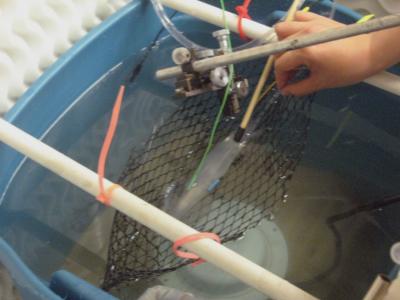The ocean is a noisy place and although we don't hear much when we stick our heads underwater, the right instruments can reveal a symphony of sound.
The noisemakers range from the low-frequency bass tones of a fish mating ritual to the roar of a motorboat. The study of how underwater animals hear is a growing topic in marine science, especially with regards to naval sonar and whales.
This summer at the Marine Biological Laboratory (MBL), zoologist T. Aran Mooney will be the first scientist to look at cephalopod hearing, using the squid, Loligo pealeii, as a model. To learn how sensitive the translucent animals are to noise, he is monitoring squid brain waves as they respond to various sounds, specifically the echolocation clicks of its main predators: the sperm whale, beaked whale, and dolphin. In addition to the brain wave experiments, he also plans to condition squid to avoid certain sounds.

"Sound is one of the most important cues for marine animals. Light doesn't travel well through the ocean. Sound does much better," says Mooney, who is a Grass Fellow at the MBL and beginning postdoctoral research at Woods Hole Oceanographic Institution this fall. He predicts that squid probably hear very low-frequency sounds, which means they pick up on fish tones and boat traffic. A better understanding of what these animals hear could reveal how human-induced noise affects cephalopods and how their auditory system evolved separately from that of fish.
Sharing the Grass Lab with Mooney are two other fellows investigating animal behavior. Keram Pfeiffer of the University of Marburg in Germany is training bees to respond to polarized light and Gwyneth M. Card of Caltech is recording how flies decide to initiate flight. They are among nine people to receive 2008 fellowships from the Grass Foundation to conduct summer research in neurobiology at the MBL.